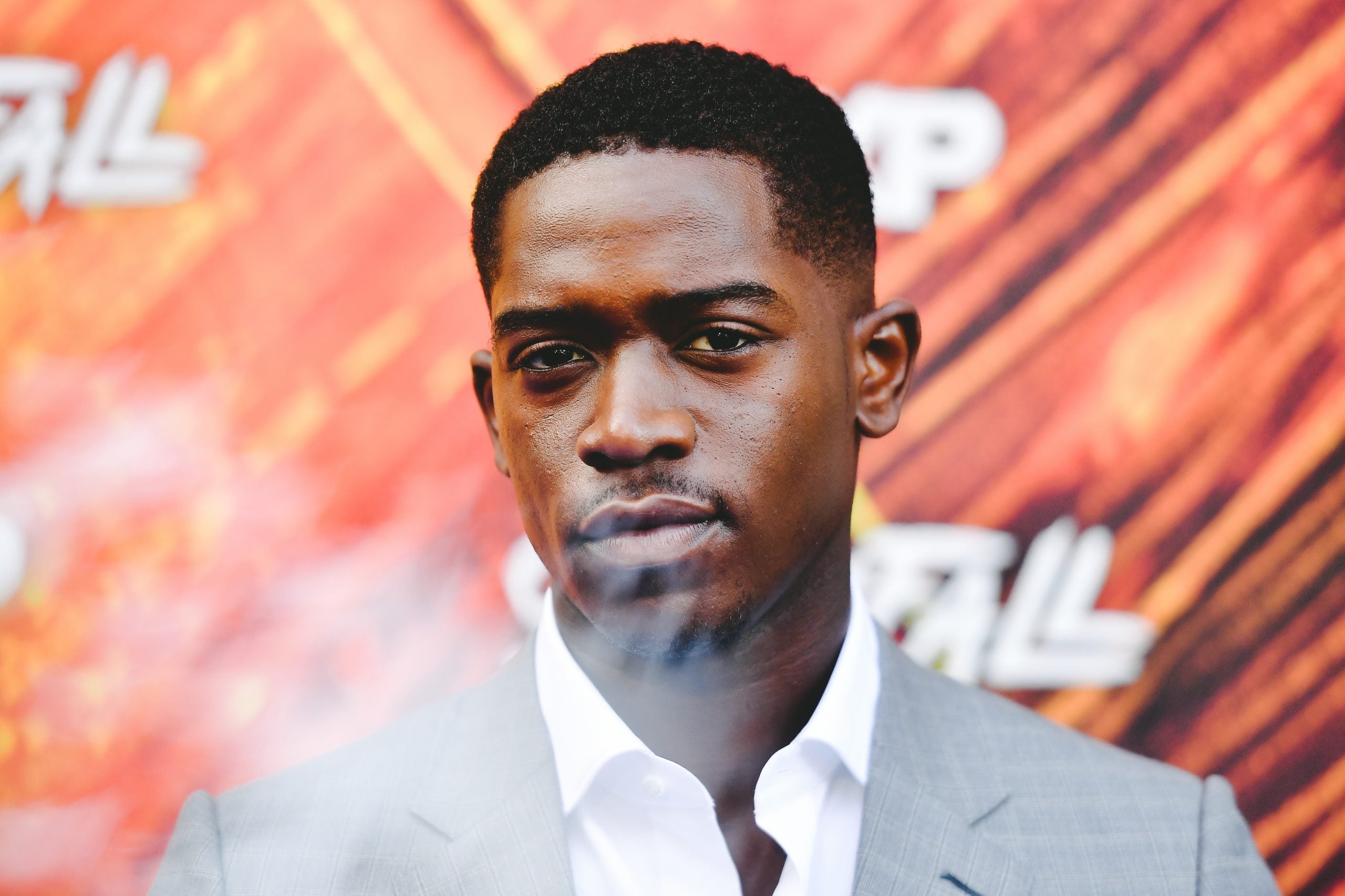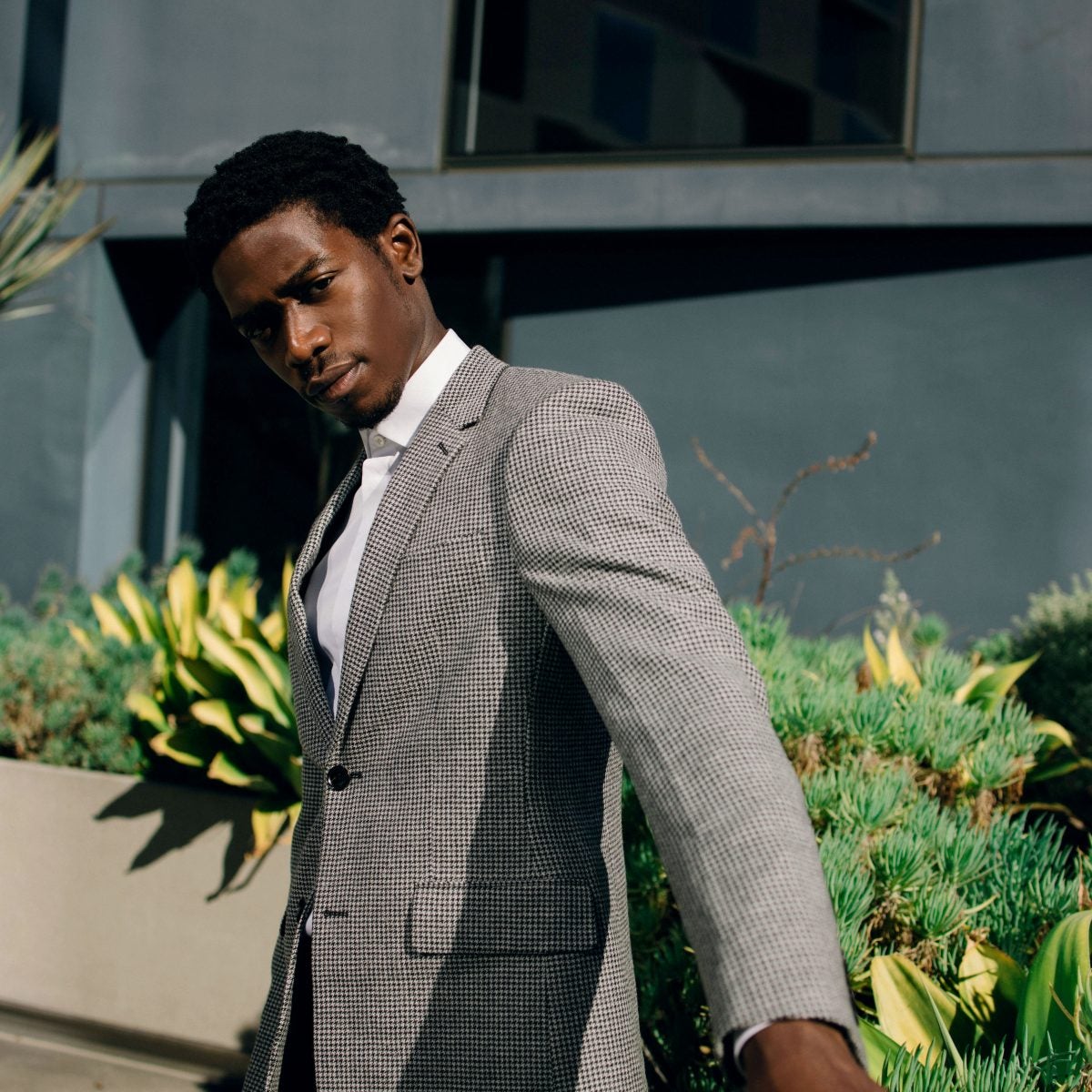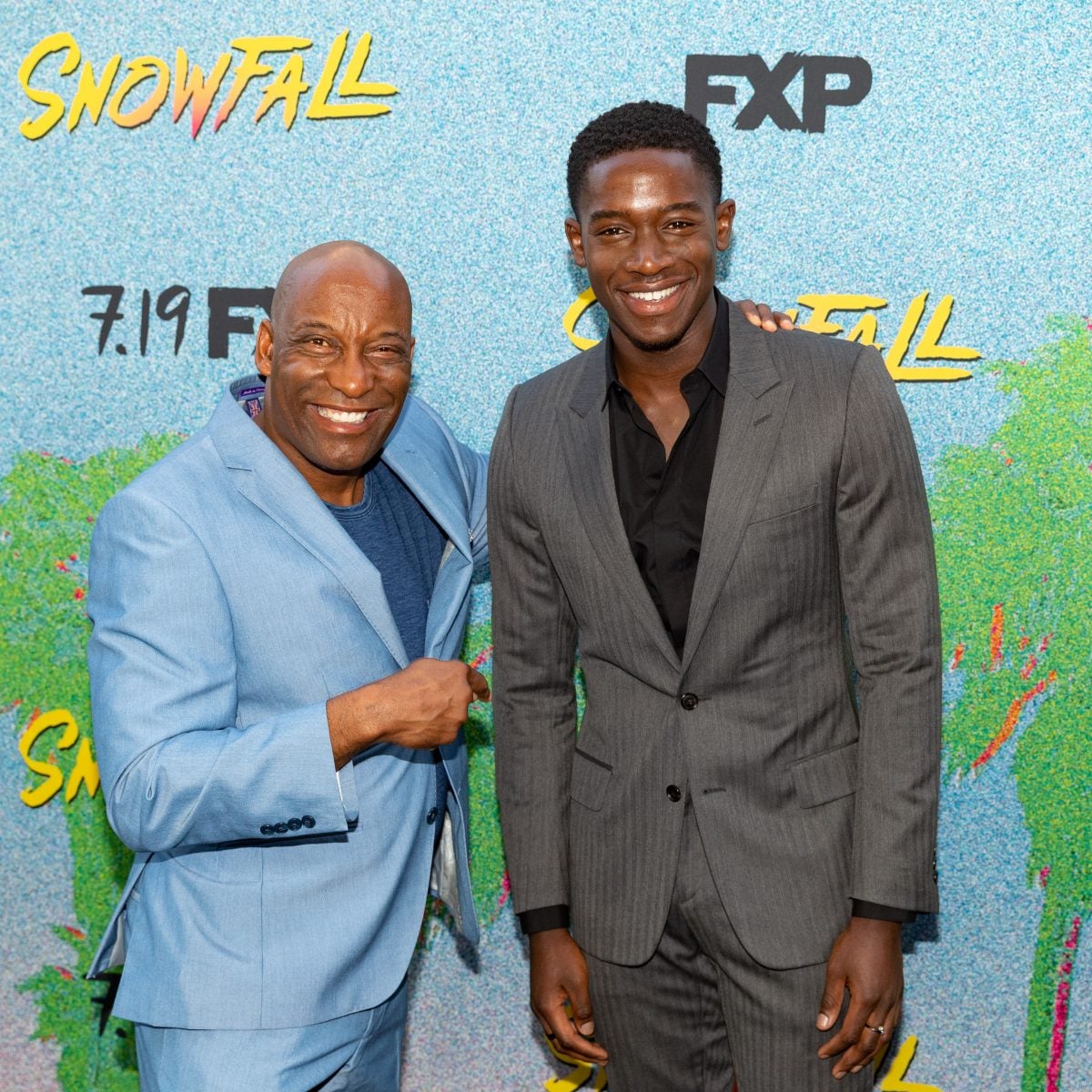When you’ve had the type of TV debut Damson Idris has, you just stand back in awe, popcorn in hand, ready for an adventure. The Peckham-born British actor is jubilant with excitement for Snowfall’s season four return today. The popular FX drama finds Idris continuing his transformative performance as Franklin Saint, a good kid in a mad city who must navigate the drug game as Los Angeles’ nascent kingpin. COVID-19 regulations delayed filming for several months last year, but that hasn’t stopped the London native from showcasing his remarkable knack for nuance to millions of eager fans.
Idris recently made his first foray into the big-budget action genre as Lieutenant Thomas Harp in Mikael Håfström’s Outside the Wire. Alongside Anthony Mackie, the captivating actor showed why landed on ESSENCE’s 2021 Young Black Hollywood Stars to Watch list. And yet, there are other cinephiles and critics who continue to hit the snooze button on the young star’s talents. As Saint, Idris is nothing short of captivating as he goes from hustling to help his mom pay bills to almost single-handedly getting South Central addicted to crack. It’s the way he brings weight and complexity to the role and utilizes the space in-between the lines that will ensure his longevity in this business.
On the eve of the new season’s release, the 29-year-old star took time out to catch ESSENCE up to speed on Franklin’s current troubles, why Eddie Murphy is a dream role he’d like to play, and what he’d tell anyone still sleeping on the kid.
[Warning: This interview contains spoilers from Snowfall season three.]
Congratulations, Damson! This new season of Snowfall and your recent success with Outside the Wire have made many believe this is your much-needed star turn. How do you feel about everything that’s been on your plate so far?
Damson Idris: Thanks, Kev, for real, man. I am taking things one day at a time. I enjoy acting immensely and that is where my happiness is at. The fact that I am able to put all my energy into something I enjoy for the world to see, I believe that I am already winning. I was given some really great advice about dealing with all of this from a close friend. He said that he’s seen [people] come and go, stay in the light and fall out of it, too. His advice to me was that in order to be ready for longevity, you should be calm, take things slow, and enjoy all the moments as they come. So, that is what I’m doing, man — I’m just enjoying the moment.
The third season of Snowfall found your character facing a lot of turmoil on different fronts. For the audience just getting familiar with the story and the show, can you bring us up to speed ahead of Franklin’s return?
Damson: As we come into the fourth season, Franklin is found with a broken spirit. For those who have seen last year’s season, he was shot three times by his girlfriend, Melody (played by Reign Edwards). And for that reason, he’s having to deal with inner and outer conflicts due to his absence on the streets. Everything is going to hell and Franklin is being forced to pick up the pieces. The brilliance of Snowfall is that it is deeply rooted in reality. It is January 1985, the Reagan Administration is in full effect, and the “War on Drugs” is really clamping down on some of the dealers in the neighborhood.
This brings in a lot more police involvement and a lot more corruption. I think, as always, Snowfall is going to keep people on the edge of their seats. It is going to introduce new characters and unlike before when people always rooted for Franklin and the main characters, this season I believe you may be torn.
Without giving any spoilers away, the conflict and corruption come to a head in a way that finds even Franklin stepping outside of his character. The pandemic that hit the US had grounded productions to a halt. How were you able, through the hiatus, to stay grounded and remain connected to the character?
Damson: It was an interesting experience because when we started taping the fourth season, it was February, and when it hit March, we had only reached episode four. Then it was said, ‘Hey, go away for two weeks. We’ll see you. We just got to deal with this little virus thing.’ Fast forward to October-November, and we pick things back up only to wrap up at the end of January. So, it’s been a really, really long journey. I’ve been sitting with a Franklin state of mind for a year.
The various rituals and events I go into when I play him became an interesting thing because I didn’t know whether to keep his spirit inside of me during the hiatus, or just let it go because there was so much uncertainty around when we’d return. For me, the way I kept connected was the constant need to tap in with my family, take on new endeavors — I started learning Spanish — and shed the character until we went back into production. It was an interesting process when we returned to work and I can’t wait to see the viewer’s reactions, and just see if they notice if the pandemic actually influenced how this art is taken in.
Your process as an actor is budding and people are noticing in a major way. What are some dream roles that you envision for yourself now after filming Outside the Wire?
Damson: I welcome it all, man [laughs]. I welcome people trusting me to play some of these heroes that they admire. I am overjoyed to participate in that responsibility. For me personally, I’ve always said this before, but I would love to play Eddie Murphy. His person and his character are so different to some of the roles I’ve taken in this industry, so I think it would be cool to see me in that light. I also admire the life of Yasuke [an African-born samurai] and would love to play the Mozambique warrior and share his story during the Honnō-ji Incident.
The late Chadwick Boseman was originally slated to play Yasuke in a live-action film, while Lakeith Stanfield will voice the samurai in Lesean Thomas’s upcoming TV series. It is impressive how this shift in the industry has allowed creatives such as yourself to use Hollywood as a platform to speak directly to issues outside of the big screen. Your contemporaries like John Boyega, Yara Shahidi, and others, really speak out for those unable to be heard. With that in mind, how do you feel about your own work as an actor-activist?
Damson: I think it all speaks volumes. I always say there are three ways to utilize your purpose to advocate for others. You could be involved directly in a movement. You can be involved with your wallets and support. Or, you can be on the front lines, march, and speak out like many of us did in the summer, and have been doing for years now. There are those who could do all three with the position I’m in now, and I understand that responsibility. I am still growing. There are a whole load of people in front of me who are doing amazing things and I hope to continue to be on these front lines together.
I am focusing on talking about the movement and supporting the movement as a group rather than as an individual. We all have phones, scroll through Twitter, and love rattling off our opinions without really doing the work. That may be fine for some, but I am looking for the leaders of today, those people who I can get behind, who I could put my platform behind, so that they’re better supported and we can make change.
It is interesting that you’re back home in London, and I am speaking to you here in Los Angeles. What were some of the sights, smells, and sounds that were interesting to you when you first arrived here to start filming Snowfall?
Damson: I was shocked that there were palm trees and perfectly cut lawns in the hood. I used to say to [rapper and Snowfall dialect coach] WC (Dub-C), ‘Man, look at this place. How can any crime happen here? It’s beautiful.’ Dub-C would tell me, ‘That’s why they call it Killafornia. You think it’s one thing, when really, it’s a different thing.’ That was the biggest thing that stuck out to me — the beauty mixed with the tragedy and brutality attached to the neighborhood. I started to learn about the history of Los Angeles, the values of South Central — specifically — and how the area was always based on community.
You talk about gang culture, you talk about activism, you talk about building up for your own — and these are all institutions that started off within the South Central, Los Angeles community. They all stemmed from wanting to support each other however they could. So, for me, it was all about embracing that culture, embracing that history, and then mirror that with the beauty of the city.
Expressing sincere condolences to the Singleton family and you, who knew the late director closely, I wanted to ask what did you learn from him that you’ve continued to use in this upcoming season of Snowfall?
Damson: Man, thank you for saying that. The biggest thing I learned from Singleton was this: everyone you meet on the way up, you’re going to meet on the way down. Working with him allowed me to take in some very special moments and always appreciate where I am. That’s what Singleton taught me that I still use throughout this journey. Instead of fast forwarding to what’s next, I would settle into the moment and enjoy it. He would also talk to me about range, my acting choices, and work ethic. ‘Work in America, man,’ he would tell me. ‘Work in London, work in Brazil, work all around the world, man. Black people are universal, [so] tell everybody’s stories and use your talent. Use your talent to bring light to communities who don’t necessarily get the opportunity to do that.’
Now, I’m producing stories and building up my own company to give others a voice. I am working on a story about a kid in Brazil and I’m doing it because I have a platform to create jobs for many other Brazilians in that place. I am a commodity that could benefit them. It’s not about creating, co-opting the space, and then leaving nothing there to blossom. It is all about us coming together, us diving into each other’s cultures, and creating more unity between us, because that is when we are our strongest. That’s what Singleton always used to teach me [and] that’s what I’m living by today.
As a follow-up, did you learn any lessons from your Outside the Wire co-star Anthony Mackie?
Damson: [Mackie] is my big brother, for real. He’s my New Orleans soldier [laughs] and he’s the greatest, man. Working with him was a fun experience. While working the a film he really took me under his wing. He taught me about the responsibility of the role you play, how to navigate this industry, and how you should focus on happiness rather than money, fame, or anything else. This is a guy who has done over 70 movies and he’s still happy. I know a lot of people who have done almost twice as many, are madly famous, and very rich — but they’re unhappy. Mackie taught me that, one day, I could be in that position, so I should work on and focus on being happy, too.
Critics throw your name around as someone who is considered slept on. What do you think about that claim and what would you say to anyone who is sleeping on you?
Damson: [Laughs] Oh man, yeah, sleep on me some more, man. I enjoy this ride and where I am going. Once you get to the top, the only other way to go is down, and I love it when people don’t necessarily know who I am. It helps me to work on my craft and become a better character, while allowing me to still move around the world freely. Acting isn’t the only thing I want to do. In this pandemic, life has called me to ask myself who I am outside of this profession. So, whether it is being slept on or wanting more privacy, I walk on faith with that. I have friends who are nominated every single year and I see what they go through. One day, I’ll experience that too. But for now, it is all about enjoying the ride and gathering more people to see what I can do and, at least, say, ‘Hey, that guy is a good actor.’
Season Four of Snowfall returns to FX at 10 pm tonight.
Kevin L. Clark is a Brooklyn-based freelance writer and curates ESSENCE’s The Playlist. Follow him @KevitoClark.
Source: Read Full Article


